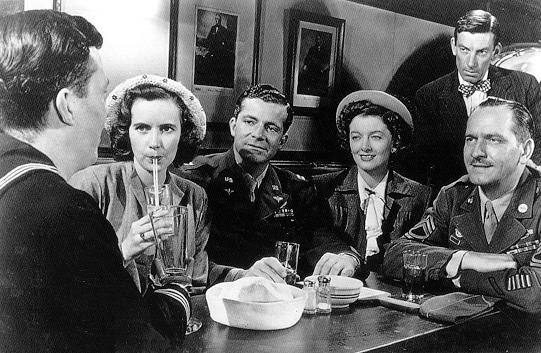Three men are returning home from service during WWII. Fred Derry (Dana Andrews), a bombardier, Al Stephenson (Frederic March), a middle- aged footsoldier, and Homer Parrish (Harold Russell), a sailor who has lost both hands, fly back to their home town of Boone City, excited, but a little apprehensive about beginning their post-war lives. Fred is returning to a beautiful wife, Marie (Virginia Mayo), whom he barely knows. Al is coming back to his wife, Milly (Myrna Loy), and their two children, who have grown up while he was gone. And Homer is coming back to face his family and his fiancée, Wilma (Cathy O’Donnell), with hooks replacing his hands.
Each of them has a lot of adjusting to do. Al is awkward with his wife at first, and insists that they go out to a bar owned by Homer’s uncle Butch (Hoagy Carmichael), where they meet Homer and Fred, who has not been able to find his wife. Al and Fred get very drunk, and Al and Milly take Fred home with them. Al’s daughter Peggy (Teresa Wright) comforts Fred when he has a nightmare about the war, and the next morning makes breakfast for him, and drops him off at his apartment. After everyone leaves the apartment, Al and Milly reconnect to their feelings for one another. Fred finally finds Marie, who is delighted to have him home. But Homer barely speaks to Wilma.
Al returns to his job at the bank, but when he approves loans to ex-servicemen who don’t meet the bank’s requirements for collateral, his boss is concerned. At a banquet, Al gets drunk and explains movingly that he learned in the war that you have to trust people, and give them a chance, and that the rules must be changed.
Homer is still uncommunicative and withdrawn until Wilma comes to his house late one night to talk to him. He is finally able to show her the extent of his injuries, and is relieved that it makes no difference to her. They set a date for the wedding.
Fred, who was a soda jerk before the war, says that is the one job he will never do again. But he finds himself back serving ice cream, when he can’t find anything else, until he punches a customer who insults Homer and the other ex-servicemen. Marie, who cares about nothing but fun and money, is quickly bored with him, and starts seeing other men.
Fred falls in love with Peggy, but when Al asks him not to see Peggy any more, he decides to leave town. At the airport, he climbs into the cockpit of one of the old bomber planes, destined to be turned into scrap metal. He meets a man who is using the metal for building and asks for a job, explaining that he knows nothing about it, but knows that he knows how to learn. He is hired.
Fred is Homer’s best man. At the wedding, Fred sees Peggy, and the words of the wedding service seem to bring them together.
Though today’s families will have a hard time relating to the specifics of the post-war era, the theme of adaptation to changing circumstances and the need for genuine closeness is a timeless one. The most important scene in the movie is the one in which Fred realizes that he can use the same skills he used in the war — especially his ability to learn — to bring him what he is looking for. Fred and Homer both have a hard time believing that they deserve love, because each feels helpless and inadequate. Homer is afraid to risk rejection by Wilma, so he brusquely ignores her. Fred plans to leave town and never see Peggy again. But both ultimately take the risk and find the love they hoped for.
Al is also brusque and awkward with Milly at first, but by their first morning together he is ready to return to the relationship they had. Milly’s description of marriage to Peggy is particularly important in this context, making it clear that “living happily ever after” requires commitment, courage, and work.
Questions for Kids:
· What were the challenges faced by each of the servicemen in adjusting to life after the war?
· Would it have been easier for Homer if his family and Wilma talked to him about his injuries when he first came home?
· Why was it easier for Homer to talk to Fred and Al about them than it was to talk to his family?
· Why was Al so awkward with Milly at first?
· What did he mean when he talked about collateral at the banquet? Why was it important for Fred to realize that he knew how to learn? How did that change the way he thought about himself?
Connections: Harold Russell, who lost his hands in a grenade accident in training, received both a special Oscar and the Oscar for Best Supporting Actor for his performance as Homer. He did not make another movie until “Inside Moves” in 1980. He also served as the Chairman of President Lyndon Johnson’s Committee on Hiring the Handicapped. The movie also won Oscars for Best Picture, Actor, Director, Musical Score, and Writer. Butch is played by Hoagy Charmichael, composer of “Stardust.” A movie with similar themes is “Til the End of Time” with Robert Mitchum and Guy Madison.
to the later movies. And I recommend a brilliant and completely engrossing new book from biographer Laurence Bergreen called Columbus: The Four Voyages
. He writes:




